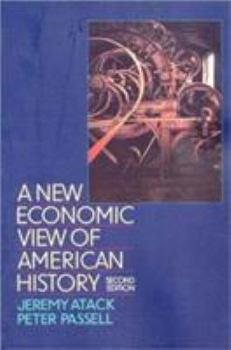A New Economic View of American History: From Colonial Times to 1940
Select Format
Select Condition 
Book Overview
This book asks such questions as: did mercantilism cause the American Revolution?; was slavery profitable?; and what were the causes of the Great Depression? This description may be from another edition of this product.
Format:Paperback
Language:English
ISBN:0393963152
ISBN13:9780393963151
Release Date:May 1994
Publisher:W. W. Norton & Company
Length:736 Pages
Weight:2.07 lbs.
Dimensions:1.1" x 6.2" x 9.3"
Customer Reviews
5 ratings
college textbook
Published by Thriftbooks.com User , 14 years ago
My son needed this textbook for a college class. It arrived really fast, in good condition, as advertised and saved us over $100. compared to the school bookstore price.
A great contribution
Published by Thriftbooks.com User , 15 years ago
This is an exceptionally well-written and analyzed book. The authors are not historians, but economists, yet this still a unique book of economic history. I took a course that used this book and I really enjoyed reading and learning about the economic history of this country, in great part thanks to this book. As a student of history I recommend this book.
American History through an Economic Filter!
Published by Thriftbooks.com User , 18 years ago
If you ever wanted to understand U.S. history on an economic basis, this is the book to read. It's beautifully written with extensive economic analysis of various aspects and subjects covering U.S. history from the profitability of slavery to continous increasing of the standards of living. The authors make some striking discoveries (for example, half of all farms in the south had no slaves at all, and yet managed to be as efficient as many which did have slaves) about productivity in the U.S. as new technologies and, in essence, a new economy evolved. The impact improvements in roads had on the economic development of the country is wonderfully detailed. The author includes multiple tables and detailed explanations as to how they reached their conclusions. All in all, an excellent book on U.S. history for economic professionals and/or buffs!
If You're Choosing Only One ...
Published by Thriftbooks.com User , 20 years ago
Let me speak here in law teacher mode: if you wanted to read just one book as background for law school, I think perhaps this should be the one. It's a model in terms both of substance and of presentation. In substance, the authors have done an admirable job of summing up the best available knowledge about the economy and how it came to be. In presentation, what they've done is to take an array of technical or specialized studies and to make them accessible to the determined non-specialist. I remember it in terms of so many wonderful anecdotes. There are the farm girls from Vermont who staffed the mills in Massachusetts until the great Irish immigration drove them back to the farm. There are the restless young men from the prairies who rode the rafts down river to New Orleans, and then set off to see the world. There are the canals that lost all their capital value with the coming of the railroads - but then kept operating anyway, because it was more worthwhile to use them than to tear them up. This is not, of course, precisely a law book. But it is a book about issues for the law: about slavery, about public land policy, about the structure of industry and finance. The chapters on the Great Depression alone would make a sufficient background for any course in constitutional or administrative law. For the authors, only two words: new edition.
Exceptional!
Published by Thriftbooks.com User , 25 years ago
This is an incredible introduction to economic history. It is clearly written, and it is easy for the non-economist to read and enjoy. If you have any interest in economic history, then this is a must read.





